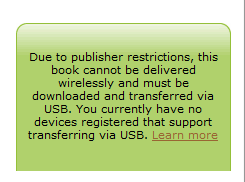
Penguin will no longer offer additional copies of eBooks and download audiobooks for library purchase. Additionally, Penguin eBooks loaned for reading on Kindle devices will need to be downloaded to a computer, then transferred to the device over USB. For library patrons, this means Penguin eBooks will no longer be available for over-the-air delivery to Kindle devices or to Kindle apps.
We know that several readers have been waiting for their Kindle book to become available for weeks. If you are a Kindle app only user and have a book on hold, please contact us with you library card number and the title of the book. We are working with Overdrive to find a solution to this problem.